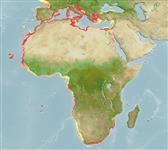Preferred temperature (Ref.
115969): 17.1 - 27.5, mean 24.4 (based on 224 cells).
Phylogenetic diversity index (Ref.
82804): PD
50 = 0.5625 [Uniqueness, from 0.5 = low to 2.0 = high].
Bayesian length-weight: a=0.01202 (0.01073 - 0.01347), b=3.02 (2.99 - 3.05), in cm Total Length, based on LWR estimates for this species (Ref.
93245).
Trophic level (Ref.
69278): 3.5 ±0.39 se; based on food items.
Daya lenting (Ref.
120179): sedang, Waktu penggandaan populasi minimum 1.4 - 4.4 tahun (K=0.24; tm=2).
Prior r = 0.54, 95% CL = 0.36 - 0.81, Based on 1 full stock assessment.
Fishing Vulnerability (Ref.
59153): Moderate vulnerability (40 of 100).
Climate Vulnerability (Ref.
125649): Low to moderate vulnerability (31 of 100).
